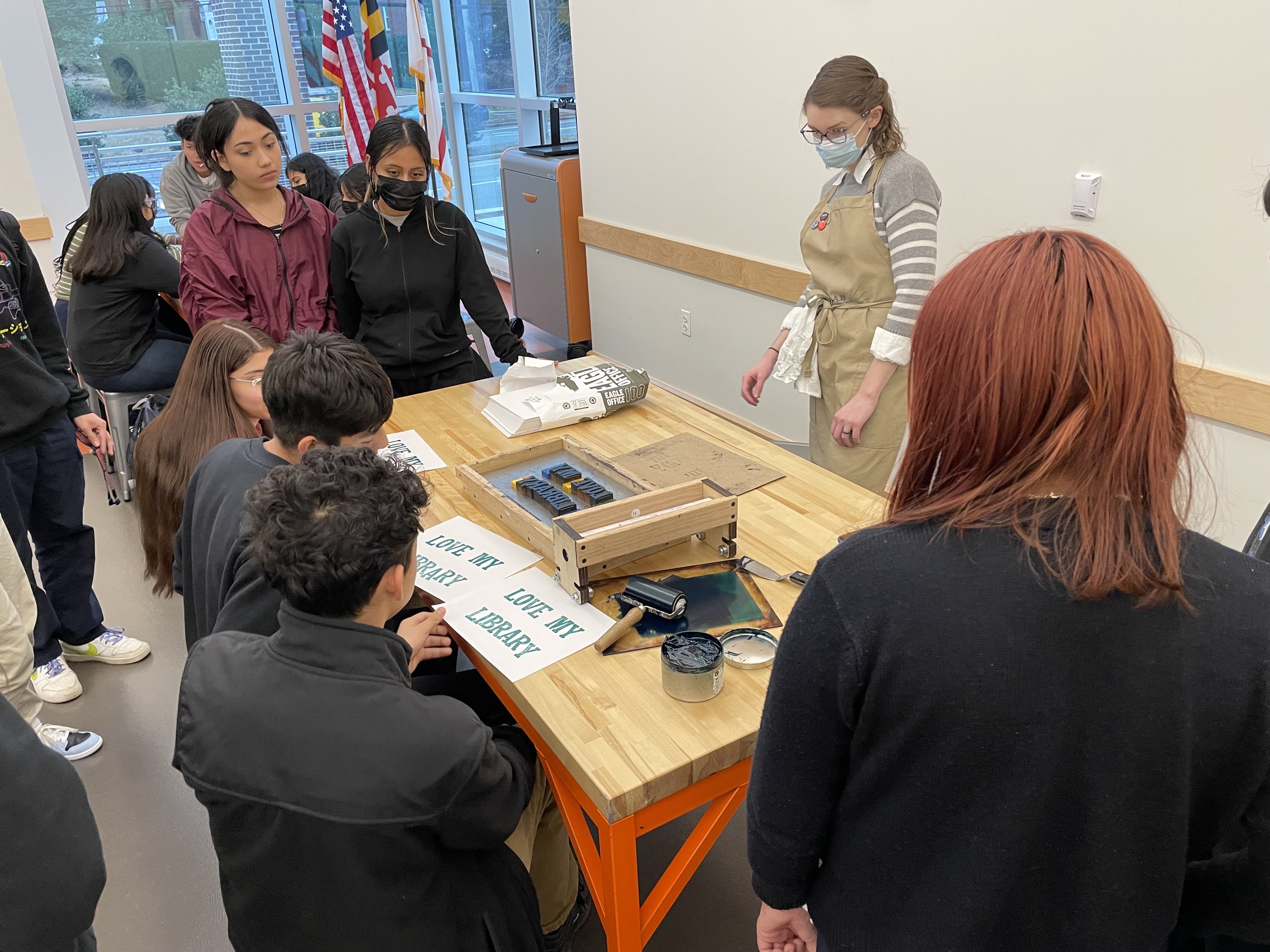English Students, Faculty Bring Humanities Beyond the University
March 10, 2023

The Center for Literary and Comparative Studies Awards in the Public Humanities seek to imagine “new forms of scholarship and creativity and teaching.”
By Jessica Weiss ’05 and Chloe Kim
For teenagers growing up in the age of social media and AI chatbots, the process of binding a book or making paper by hand may seem outdated—or even obsolete.
But on a recent Thursday afternoon, 30 high school students from Hyattsville’s Northwestern High School got the chance to experience for themselves the dynamism of the “book arts.” While getting their hands inky learning to print their own bookmarks and posters with decades-old letterpress machines, the students also had “a lot of fun,” said UMD English Ph.D. student Nat McGartland, who co-led the workshop.
It was the third in a series of seven workshops that McGartland and fellow graduate student Shannon Neal are offering to teens this semester through the Prince George’s County Memorial Library System. Thanks to funding from the Department of English’s Center for Literary and Comparative Studies (CLCS), they’re bringing presses and other supplies to the Hyattsville library to expose students to various artistic practices related to books.
“We wanted to bring book arts to younger people who are pretty much only working with the humanities in a test-based way,” said Neal, pursuing a master’s in English. “This is very inaccessible unless you go to an institution or an archive or museum or pay a hundred dollars or more for a class.”
Beginning last fall, the CLCS Awards in the Public Humanities provided $2,500 each to six projects led by graduate students and professional track faculty in the English department that “seek to connect research and teaching to current problems and captivate audiences beyond the university.” The awards also build on the scholarly, creative and pedagogical work of CLCS’ Antiracism series by supporting the principles and practices of CAARES, the Department of English’s Committee for Antiracism, Accessibility, Respect, Equity, and Social Justice.
Tita Chico, CLCS director and professor of English, is providing mentorship to the award recipients, as well as cultivating a community of UMD English scholars working on public humanities projects. The cohort’s work will culminate in a symposium on May 5.
Projects funded through the CLCS Awards span topics and formats, ranging from an archive of children’s literature, music and film; to learning workshops for teens on various topics; to using narratives and storytelling to promote dental care in underserved communities.
“We’re not inherently reproducing scholarship as it’s been, but imagining new forms of scholarship and creativity and teaching,” Chico said. “This requires a constant thoughtfulness and exchange and openness to look at our academic world and community more generally.”
Ultimately, the projects also enhance the researchers’ work and research by providing new perspectives and real-world applications of humanities scholarship.
For McGartland, who also works at UMD BookLab, engaging with students around the book arts directly ties into her doctoral dissertation, which engages with the question of experiential learning and research-creation.
“It’s the idea that one of the most effective forms of learning is by doing, by working with your hands on these projects,” she said.
A full list of projects funded through the awards is as follows:
Lecturer Dr. Anthony Batts’ “A Study on the Experiences of African American Male English Educators and Their Use of Culturally Responsive Teaching in Urban Schools” is collecting oral narratives of African American male English educators in Prince George's County, Montgomery County and Washington, D.C., to identify how educators adapt their teaching in a diverse or multicultural setting. The project aims to highlight how these experiences present a unique dynamic and educational perspective within the K-12 school environment.
Ph.D. candidate Fernando Duran’s “Central American Literature: Environment, Archive, and Access” creates an archive of Central American literature, music and film for all ages, bringing in children’s stories in Spanish from Central America and hosting story time and music events at Prince George’s County libraries. It also provides a way for Latinx and Central American people to reflect on these texts and the environments they navigate, both in Central America and in Prince George’s County.
Ph.D. candidate Erin Green’s “Community Justice: Writing and Organizing for the Public” hosts eight weeks of community programming for a Hyattsville teen group geared toward youth activism and engaging in social justice issues. The programming includes writing projects, collaborative workshops and guest speakers.
Ph.D. candidate Nat McGartland and M.A. candidate Shannon Neal’s “Hyattsville Teens + Book Arts” project brings book arts education to the Prince George’s County Memorial Library System through bi-weekly workshops for teens at the Hyattsville branch. By bringing tools, materials, and touchable examples to the workshops, the project aims to make book arts more accessible and equitable, alongside building leadership skills, creative confidence, artistic skills and engagement with the humanities outside of a test-based environment.
Lecturer Dr. Michelle Moncrieffe’s “Narratives and Medical Education” project is focused on understanding and responding to racism in health care by offering free dental care at the public library and telling stories to inform the public.
Ph.D. candidate Fatima Seck’s “Community Now” hosts tools and resources that help build community among marginalized people within and outside academia. The project includes a podcast called “Conversations with Scholars,” where Seck hosts “conversations with Black and brown scholars nationwide about their research and time in academia.”
Photo courtesy of Nat McGartland and Shannon Neal

